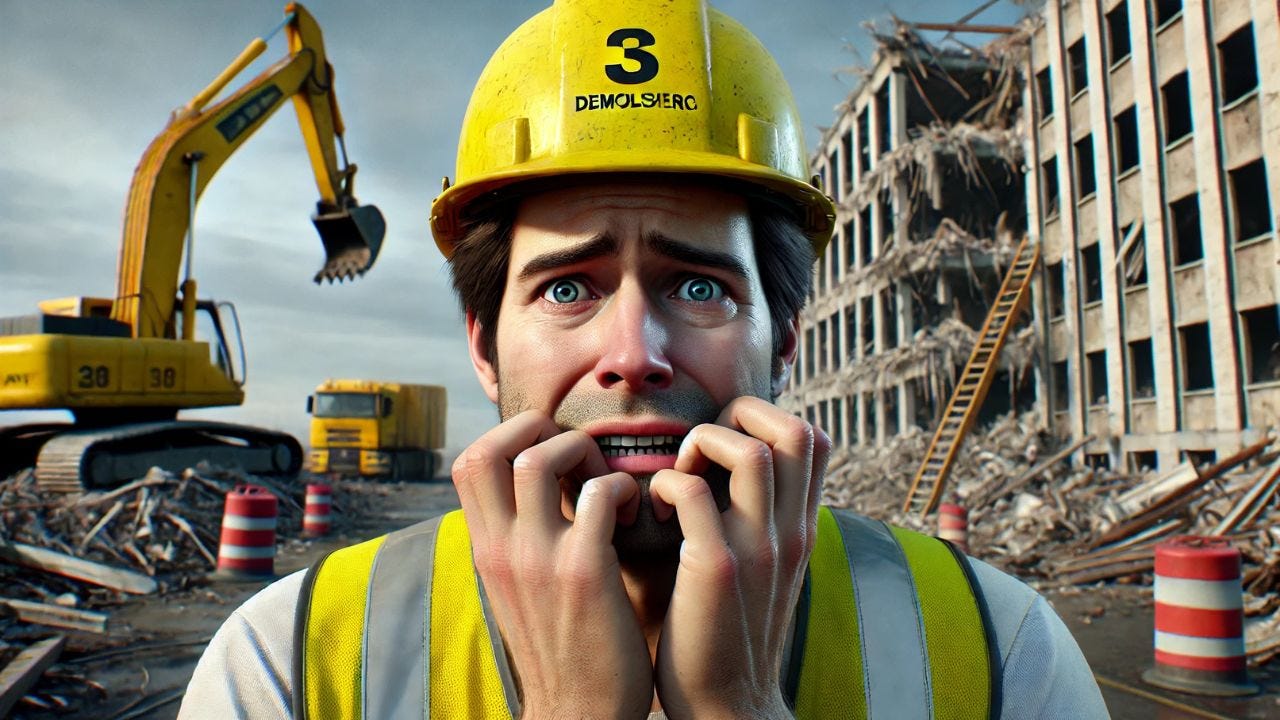When did we become so afraid?
Demolition men are as hard as nails. But they are apparently afraid to speak out and to voice their fears and concerns.
I have noticed a strange phenomenon. It is a phenomenon that points to something unspoken, something big, and something potentially sinister.
Given what I do for a living, I monitor feedback on social media very, very closely. I try my best to respond to any and all comments across LinkedIn, Instagram, YouTube, and Facebook.
Those comments are a mixed bag. Some agree with something I have written or said; some disagree vehemently; and some tell me that I am an idiot (or worse). But here’s the thing.
If I have criticised some injustice suffered by the industry as a whole, I regularly get messages telling me that I am “on the money,” or that I am saying what others should be saying.
If, however, I am criticising a company, a trade association, or an organisation, I very rarely get any public comments. Instead, I get phone calls, text messages, and emails. In other words, they agree with my comments and sentiments. But they do so strictly in private.
Now, this isn’t peculiar to me. It is not peculiar to social media. I believe this speaks to a wider issue across the sector. And it begs the question. When did we become so afraid?
When did we become so afraid to speak openly about our fears and concerns for the demolition and construction industry?
When did we become so afraid to hold to account those that sit atop the industry; the trade associations, the governing bodies, and the legislators?
When did we become so afraid to point out the injustices and inequities of working within the industry?
When did we become so afraid to call out dangerous practices and health and safety breaches?
When did we become so afraid to call out the use and abuse of drugs and alcohol on sites?
When did we become so afraid to speak out about misogyny and racism?
When did we become so afraid to challenge working practices that place workers under undue stress and unnecessary pressure?
Maybe the question isn’t WHEN did this happen but WHY. Because, let’s be honest, ‘fearful’ is not the first word that springs to mind when you see a hard-nosed demolition man. They are only human, of course. But if I was going into battle, I’d feel a lot more confident if I had a bunch of hairy-arsed demolition men by my side.
And yet they too are cowed. Their voices quiet and subdued. In the face of a recent uptick in fatal accidents and amidst an industry-wide mental health crisis, they have been rendered mute.
So what’s changed? Have workers always been afraid to speak up, or has this fear gradually crept in over time? If you go back a few decades, construction and demolition workers were vocal about unfair wages, unsafe conditions, and management failures. But today, silence prevails.
Is it because job security has become so fragile? Are workers afraid that speaking out could cost them not just their current job but their future prospects in an industry where reputations spread quickly? Are companies so dominant now that even trade associations dare not ruffle feathers?
The irony is that this silence is harming the very people who keep the industry running. Unsafe working conditions persist, stress levels rise, and the same mistakes get repeated because no one dares to challenge the system. We have seen this play out before. Companies cut corners to save money. Workers warn of dangers, but their voices are ignored or silenced. Then a tragedy occurs, and suddenly, everyone is asking how it was allowed to happen.
The consequences of silence are not just hypothetical. They are real. A worker who doesn't speak up about a hazard might be the one injured by it. A worker who stays quiet about a toxic work culture might see a colleague break under the strain. And an industry that refuses to hold leadership accountable will only continue to serve those at the top while those at the bottom suffer.
It’s not just workers who stay silent, though. Even those in leadership positions hesitate to rock the boat. Trade associations now tread carefully, wary of upsetting those they rely on for funding or cooperation. They hold meetings and they occasionally make pronouncements. But how often do they take decisive action? How often do they demand real change? Even when faced with very public corruption and an existential threat from the environmental lobby, the trade associations seemingly take a vow of silence.
There are exceptions, of course. There are those brave enough to speak up, to push back against unsafe conditions and unethical practices. But they are few, and often, they stand alone. And when they do speak, their words are met with whispers of agreement rather than a chorus of support.
There is a certain irony to all this. All that I have just said will go out on social media in both video and written form.
The chances are that it will resonate with many. The chances are that it will strike a chord. A few may even take the time to share their own experiences or to agree with the crux of what I have said.
But most, if not all of them, will do so privately.
And that, right there, is the problem.





